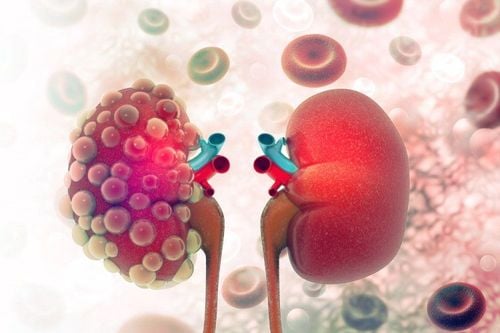This is an automatically translated article.
Blood in the urine is definitely a warning sign, at any time, if blood in the urine occurs, it is necessary to go to medical facilities for examination as soon as possible.1. What is bloody urine?
Hematuria is an abnormal phenomenon when red blood cells appear in the urine. There are two types of hematuria: gross hematuria (observed directly with the naked eye when the urine is pink or red due to too many red blood cells, which changes the color of the urine) and microscopic hematuria. The number of red blood cells in the urine is small, so it does not change the color of the urine, red blood cells can only be detected through testing).
2. Symptoms of bloody urine
If it is gross hematuria, the symptom will be very recognizable, which is a change in urine color to pink, red or brown due to the presence of red blood cells in the urine. In addition, blood clots may also occur. If it is microscopic hematuria, there is no change in urine color.
In addition to a change in urine color, hematuria may be accompanied by one or more other signs and symptoms.

Màu sắc nước tiểu đổi màu là dấu hiệu của tiểu ra máu
3. When to see a doctor?
See your doctor immediately if you notice blood in your urine.
Certain medications (such as the laxative Ex-lax) and certain foods (including beets, rhubarb, berries, etc.) can make urine red. However, a change in urine color due to medication, food, or even exercise should not cause problems and should clear up on its own in a day or two.
Blood in the urine is completely different from the change in color of urine due to other causes, but based on the sense of color change alone, it will be difficult to distinguish, so it is necessary to see a doctor .
4. Causes of blood in the urine
Red blood cells present in the urine can originate in the kidneys or any part of the urinary tract. There are various problems that cause red blood cells to pass into the urine, including:
Urinary tract infections : Occurs when bacteria enter the body by traveling back through the urethra into the bladder and grow Here, causing symptoms such as a constant urge to urinate, a burning pain when urinating, and a very unpleasant odor in the urine. However, in some people, especially in the elderly, the only manifestation may be microscopic hematuria. Kidney infection (pyelonephritis): Occurs when bacteria enter the kidney through the bloodstream or enter the kidney through the ureter. Signs and symptoms are often similar to those of a bladder infection, but kidney infections are more common with fever and hip pain. Kidney or bladder stones: Stones can form and grow in the kidney or bladder. Usually, the patient is painless, so the existence of a stone is not detected until an obstruction or stone passes through the urine, and renal colic is a typical sign of a kidney stone. Both kidney stones or bladder stones can cause gross hematuria and microscopic hematuria. Enlarged Prostate: The prostate gland, which lies below the bladder and surrounds the beginning of the urethra, often becomes enlarged as a man enters middle age. When the prostate gland enlarges, it puts pressure on the urethra and partially obstructs the flow of urine. Signs and symptoms of benign prostatic hyperplasia (BPH) include difficulty urinating, an urgent need to urinate, a constant urge to urinate, and may also be accompanied by urination. gross or microscopic bleeding. Prostate infections cause similar signs and symptoms. Kidney disease: Microscopic hematuria is a common symptom of glomerular disease. Glomerular disease may be in the setting of another systemic disease, such as diabetes, or it may occur independently. Strep or viral infections, vasculitis, and related autoimmune problems such as IgA nephropathy, can trigger the onset of glomerulonephritis. Cancer: Gross hematuria can be a sign of advanced kidney, bladder, or prostate cancer. These cancers show very few signs and symptoms in the early stages, when treatment is easier and there is a greater chance of success. Genetic disorders: Sickle cell anemia, Alport syndrome, ... can all cause gross hematuria or microscopic hematuria. Kidney injury: Trauma or injury to the kidney caused by an accident or sports collision can cause blood in the urine. Certain medications: Cyclophosphamide (an anti-cancer drug) and penicillin can cause hematuria. Gross hematuria sometimes occurs with the use of drugs that have anticoagulant effects, such as aspirin or heparin. Intense exercise: Gross hematuria can occur after intense exercise, although it is rare, and the cause is still unknown, may be related to bladder injury , dehydration or damage to red blood cells during exercise. Athletes are the most common, although anyone can develop blood in the urine after intense exercise. If, after exercising, you see blood in your urine, do not subjectively think that the cause is due to exercise, but see a doctor immediately. Often the cause of hematuria is unknown.

Ung thư thận là một trong những nguyên nhân khiến tiểu ra máu
5. Risk factors for hematuria
Almost everyone, including children and adolescents, can have red blood cells in their urine. Risk factors that make hematuria more likely include:
Age: Men over 50 sometimes have blood in their urine due to an enlarged prostate. Recent bacterial infection: Nephritis following a bacterial or viral infection (postinfective glomerulonephritis) is one of the causes of gross hematuria in children. Family history: If you have a family history of kidney disease or kidney stones, you are more likely to have blood in your urine. Certain medications: Aspirin, nonsteroidal anti-inflammatory drugs, and antibiotics such as penicillin have been known to increase the risk of hematuria. Intense exercise: Athletes are particularly susceptible to hematuria, although anyone who exercises with intense intensity is at risk of hematuria. At Vinmec International General Hospital, there is a Urinary Pathology Screening Package with many utilities, including: Early detection of possible urinary diseases. Especially prostate diseases (benign prostatic hypertrophy, prostate cancer). The pathology of urinary stones .... thereby helping customers take preventive measures.
When registering for the urological screening package, customers will be examined by a urologist, ultrasound, urine culture... to detect the disease accurately and promptly.
To find out more about Vinmec's Service Packages and register for an appointment, you can contact HERE.
Articles refer to sources: NHS, Mayoclinic.org, webmd.com, healthline.com
MORE:
Urine test in children with urinary tract infections What does hematuria, blood in urine signal? Signs and treatment of urinary tract infections in women













